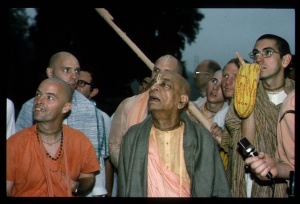SB 3.8.7: Difference between revisions
m (1 revision(s)) |
No edit summary |
||
| Line 1: | Line 1: | ||
{{info | {{info | ||
|speaker=Maitreya | |speaker=Maitreya Ṛṣi | ||
|listener=Vidura | |listener=Vidura | ||
}} | }} | ||
[[Category:Srimad-Bhagavatam - Canto 03 Chapter 08|S07]] | |||
[[Category:Bhagavatam Verses Spoken by Maitreya Rsi - Vanisource|030807]] | |||
<div style="float:left">'''[[Srimad-Bhagavatam]] - [[SB 3|Third Canto]] - [[SB 3.8: Manifestation of Brahma from Garbhodakasayi Visnu|Chapter 8: Manifestation of Brahmā from Garbhodakaśāyī Viṣṇu]]'''</div> | |||
<div style="float:right">[[File:Go-previous.png|link=SB 3.8.6]] '''[[SB 3.8.6]] - [[SB 3.8.8]]''' [[File:Go-next.png|link=SB 3.8.8]]</div> | |||
{{RandomImage}} | |||
==== TEXT 7 ==== | ==== TEXT 7 ==== | ||
<div | <div class="verse"> | ||
proktaṁ kilaitad bhagavattamena | :proktaṁ kilaitad bhagavattamena | ||
nivṛtti-dharmābhiratāya tena | :nivṛtti-dharmābhiratāya tena | ||
sanat-kumārāya sa cāha pṛṣṭaḥ | :sanat-kumārāya sa cāha pṛṣṭaḥ | ||
sāṅkhyāyanāyāṅga dhṛta-vratāya | :sāṅkhyāyanāyāṅga dhṛta-vratāya | ||
</div> | </div> | ||
| Line 16: | Line 22: | ||
==== SYNONYMS ==== | ==== SYNONYMS ==== | ||
<div | <div class="synonyms"> | ||
''proktam''—was said; ''kila''—certainly; ''etat''—this; ''bhagavattamena''—by Lord Saṅkarṣaṇa; ''nivṛtti''—renunciation; ''dharma-abhiratāya''—unto one who has taken this religious vow; ''tena''—by Him; ''sanat-kumārāya''—unto Sanat-kumāra; ''saḥ''—he; ''ca''—also; ''āha''—said; ''pṛṣṭaḥ''—when inquired of; ''sāṅkhyāyanāya''—unto the great sage Sāṅkhyāyana; ''aṅga''—my dear Vidura; ''dhṛta-vratāya''—unto one who has taken such a vow. | |||
</div> | </div> | ||
| Line 23: | Line 29: | ||
==== TRANSLATION ==== | ==== TRANSLATION ==== | ||
<div | <div class="translation"> | ||
Lord Saṅkarṣaṇa thus spoke the purport of Śrīmad-Bhāgavatam to the great sage Sanat-kumāra, who had already taken the vow of renunciation. Sanat-kumāra also, in his turn, when inquired of by Sāṅkhyāyana Muni, explained Śrīmad-Bhāgavatam as he had heard it from Saṅkarṣaṇa. | Lord Saṅkarṣaṇa thus spoke the purport of Śrīmad-Bhāgavatam to the great sage Sanat-kumāra, who had already taken the vow of renunciation. Sanat-kumāra also, in his turn, when inquired of by Sāṅkhyāyana Muni, explained Śrīmad-Bhāgavatam as he had heard it from Saṅkarṣaṇa. | ||
</div> | </div> | ||
| Line 30: | Line 36: | ||
==== PURPORT ==== | ==== PURPORT ==== | ||
<div | <div class="purport"> | ||
This is the way of the paramparā system. Although Sanat-kumāra, the well-known great saintly Kumāra, was in the perfect stage of life, still he heard the message of Śrīmad-Bhāgavatam from Lord Saṅkarṣaṇa. Similarly, when he was questioned by Sāṅkhyāyana Ṛṣi, he spoke to him the same message he had heard from Lord Saṅkarṣaṇa. In other words, unless one hears from the proper authority one cannot become a preacher. In devotional service, therefore, two items out of the nine, namely hearing and chanting, are most important. Without hearing nicely, one cannot preach the message of Vedic knowledge. | This is the way of the ''paramparā'' system. Although Sanat-kumāra, the well-known great saintly Kumāra, was in the perfect stage of life, still he heard the message of [[Srimad-Bhagavatam|''Śrīmad-Bhāgavatam'']] from Lord Saṅkarṣaṇa. Similarly, when he was questioned by Sāṅkhyāyana Ṛṣi, he spoke to him the same message he had heard from Lord Saṅkarṣaṇa. In other words, unless one hears from the proper authority one cannot become a preacher. In devotional service, therefore, two items out of the nine, namely hearing and chanting, are most important. Without hearing nicely, one cannot preach the message of Vedic knowledge. | ||
</div> | </div> | ||
__NOTOC__ | |||
<div style="float:right; clear:both;">[[File:Go-previous.png|link=SB 3.8.6]] '''[[SB 3.8.6]] - [[SB 3.8.8]]''' [[File:Go-next.png|link=SB 3.8.8]]</div> | |||
__NOTOC__ | |||
__NOEDITSECTION__ | |||
Revision as of 13:51, 4 May 2021

A.C. Bhaktivedanta Swami Prabhupada
TEXT 7
- proktaṁ kilaitad bhagavattamena
- nivṛtti-dharmābhiratāya tena
- sanat-kumārāya sa cāha pṛṣṭaḥ
- sāṅkhyāyanāyāṅga dhṛta-vratāya
SYNONYMS
proktam—was said; kila—certainly; etat—this; bhagavattamena—by Lord Saṅkarṣaṇa; nivṛtti—renunciation; dharma-abhiratāya—unto one who has taken this religious vow; tena—by Him; sanat-kumārāya—unto Sanat-kumāra; saḥ—he; ca—also; āha—said; pṛṣṭaḥ—when inquired of; sāṅkhyāyanāya—unto the great sage Sāṅkhyāyana; aṅga—my dear Vidura; dhṛta-vratāya—unto one who has taken such a vow.
TRANSLATION
Lord Saṅkarṣaṇa thus spoke the purport of Śrīmad-Bhāgavatam to the great sage Sanat-kumāra, who had already taken the vow of renunciation. Sanat-kumāra also, in his turn, when inquired of by Sāṅkhyāyana Muni, explained Śrīmad-Bhāgavatam as he had heard it from Saṅkarṣaṇa.
PURPORT
This is the way of the paramparā system. Although Sanat-kumāra, the well-known great saintly Kumāra, was in the perfect stage of life, still he heard the message of Śrīmad-Bhāgavatam from Lord Saṅkarṣaṇa. Similarly, when he was questioned by Sāṅkhyāyana Ṛṣi, he spoke to him the same message he had heard from Lord Saṅkarṣaṇa. In other words, unless one hears from the proper authority one cannot become a preacher. In devotional service, therefore, two items out of the nine, namely hearing and chanting, are most important. Without hearing nicely, one cannot preach the message of Vedic knowledge.